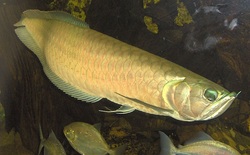Silver Arowana

Silver Arowana's are the cheapest Arowana's on the market. They have the amazing ability to leap out of the water to catch their pray and are therefore often referred to as the monkey fish. Dragon fish is another common name used because of its primitive and ancient look furthermore the scales on the Arowana resemble that of a dragons. Arowana's must be kept with fish that are large and hence cannot be swallowed and that can tolerate their active swimming. They can also be kept with their own kind as they do not display aggression towards their own kind. Do feed any types of Arowana on a high fat diet as this is linked to the disease Drop Eye. They can also be easily spooked so be progressive with anything you do around them or to the tank, for example when turning on the tank light to on lights around the tank first so the fish can adjust. Remember, Arowanas' are expensive to care for and are not suitable for the inexperienced fish keeper. A water change should be carried out once a week as they are quite sensitive.
Profile
Difficulty: Hard
Temp: 24°C (75°F) to 28°C (82°F)
Origin: Amazon River
Size: 31 inches (90 cm) in captivity or 4ft (120cm) in the wild
Tanks size: 300 gallons (1135L) for a fully grown adult.
pH: 6-7
Growth: 5cm per year when juveniles
Food: insects, shrimp, fish (guppies are good), frogs, pellet foods (floating pellets are said to be the best), mosquite larvae, crickets, plankton. Don't feed them to many goldfish and don't make live food a staple diet, keep it as a treat, perhaps once a week.
Hardness: 1-8dH
Profile
Difficulty: Hard
Temp: 24°C (75°F) to 28°C (82°F)
Origin: Amazon River
Size: 31 inches (90 cm) in captivity or 4ft (120cm) in the wild
Tanks size: 300 gallons (1135L) for a fully grown adult.
pH: 6-7
Growth: 5cm per year when juveniles
Food: insects, shrimp, fish (guppies are good), frogs, pellet foods (floating pellets are said to be the best), mosquite larvae, crickets, plankton. Don't feed them to many goldfish and don't make live food a staple diet, keep it as a treat, perhaps once a week.
Hardness: 1-8dH

